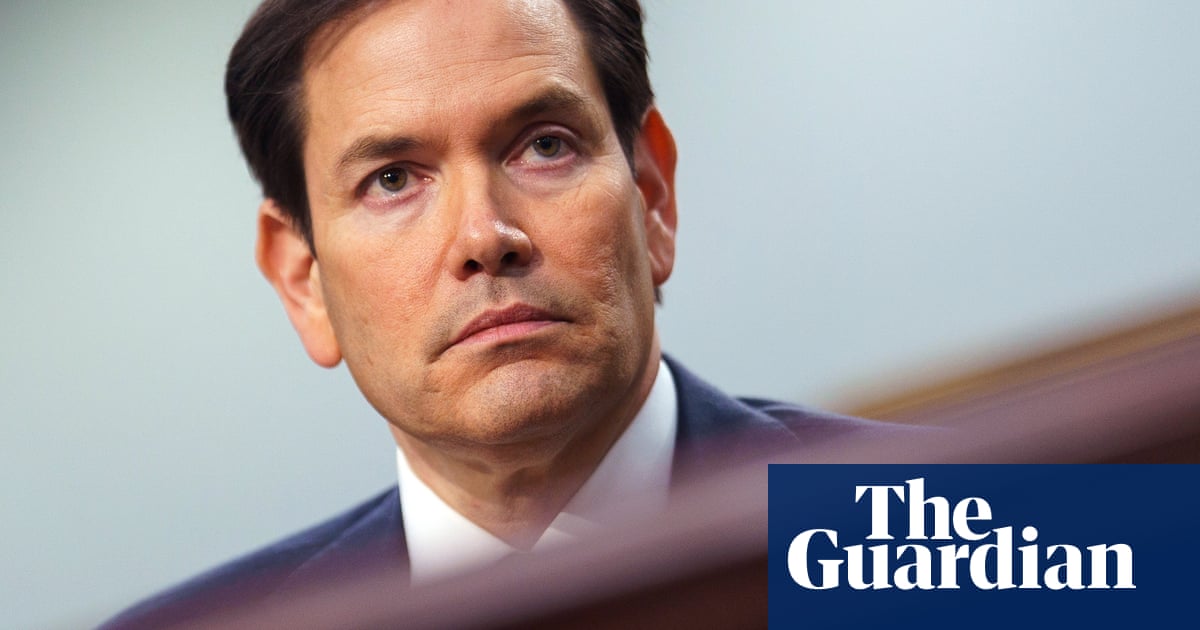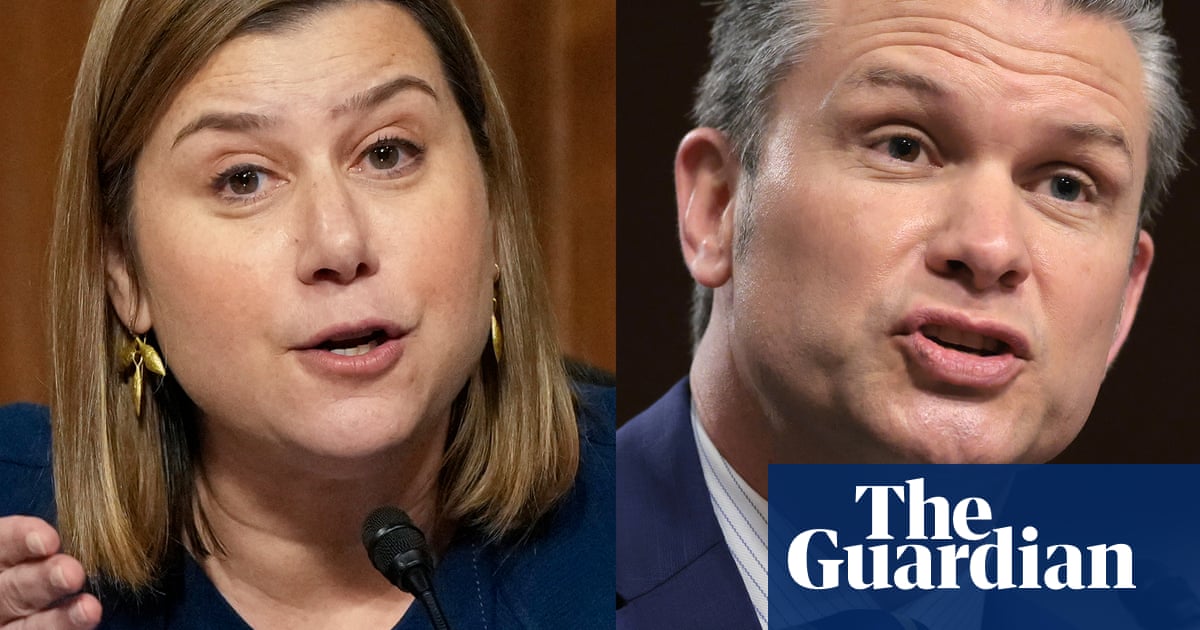The youth activists who put the Green New Deal on the political map are launching a new campaign to “villainize big oil” which will push for the industry to pay for climate action so the costs don’t fall on ordinary people.
Seven years ago, the Sunrise Movement captured headlines when its members stormed then incoming House speaker Nancy Pelosi’s office, demanding the rapid phase-out of fossil fuels and creation of good jobs.
The movement helped inspire some of Joe Biden’s green policies. But under Donald Trump, those moves – and other, decades-old environmental regulations – are under siege. A major reason for that, Sunrise says, is the president’s allegiance to oil bosses over ordinary people.
“He takes his orders from big oil billionaires like the ones who funded his campaign,” said Stevie O’Hanlon, co-founder and communications director of the Sunrise Movement.
Now, the Sunrise Movement is calling for polluters to foot the bill for climate action and asking down-ballot candidates to do the same. In the lead-up to the 2026 midterm elections, the organization will be rallying young people around the country under the banner “End the Oligarchy, Save Our Futures”.
The campaign will kick off with a virtual call on Wednesday night, which will be streamed at nationwide watch parties and feature California representative Ro Khanna and TV star Hannah Einbender. It will attempt to reframe climate action, which powerful conservatives have long aimed to write off as a “culture war” issue despite its material repercussions for ordinary people.
“Climate disasters are devastating working people around the country – destroying homes and pushing people into crushing debt. It’s far past time that big oil be held accountable,” said Khanna.
With the new effort, organizers will try to harness the populist outrage that Sunrise believes helped elect Donald Trump, Aru Shiney-Ajay, Sunrise’s executive director, said.
“What we’re seeing right now around the country is a deep sense that this system isn’t working for us and that it is working for billionaires and rich people,” said Shiney-Ajay. “The polluters pay frame speaks to that idea that some of the richest companies should help clean up the mess they made, while also undermining Trump on something where he polls the lowest, which is on climate issues.”
A focus of the campaign will be passing “climate superfund” bills – which require fossil fuel companies to pay for climate damage – in statehouses across the country. Vermont and New York last year became the first two states to pass such legislation, and California, Maryland, Massachusetts, New Jersey and Oregon are considering similar measures.
“We see this as a 50-state campaign,” said O’Hanlon.
To obtain its endorsement, Sunrise has since its founding required political candidates to eschew money from oil donors. Now, it will also ask endorsees to support such legislation.
Passing “polluters pay” bills may be a long shot in some states, but Sunrise thinks it has a better chance than other kinds of climate measures, potentially even garnering support from conservatives who are concerned about both corruption and their pocketbooks. The two successful Vermont and New York bills passed with co-sponsorship from Republicans, organizers note.
“We’re bringing this message to the people who liked the call for government efficiency that we’ve seen from Doge and Elon Musk and Trump,” said Ramón Pereira Bonilla, a 24-year-old Sunrise organizer in the flood-prone city of Orlando, Florida. “We’re saying: ‘We want to make the government more efficient for taxpayers, save taxpayers money.’”
In Florida, activists hope to see lawmakers introduce a bill in the fall or next spring, Pereira Bonilla said, adding that canvassing in the state has already suggested interest from conservatives.
In California, where historic fires ravaged Los Angeles earlier this year, advocates are looking to pass a climate superfund proposal before the legislative session ends in September, helping the state pay for infrastructure damage, public health programs and climate resilience measures, said Nico Gardener Serna, 26, of Sunrise’s Los Angeles chapter.
after newsletter promotion
“We’ve known that fossil fuel extraction has caused the climate crisis for decades,” he said. “There is a sustained and powerful effort from the community to hold corporations accountable.”
Laws in Vermont and New York are facing legal challenges from oil interests, and Trump in April issued an order to “stop the enforcement” of climate superfund laws. But Sunrise and other activist groups believe they can still succeed.
“When we organize, we can rewrite the rules and build something more fair, more honest and more prepared for the future we deserve,” Cassidy DiPaola, communications director of the Make Polluters Pay campaign, said.
Sunrise’s new campaign will also aim to re-energize the youth climate protest movement, which advocates say has lost steam in recent years. To do so, it will hold nationwide “school strikes” like the ones popularized by the young Swedish activist Greta Thunberg, and will also explore using more disruptive nonviolent tactics than they have previously employed.
The rallies will aim to build momentum and courage in service of a prospective general strike in 2028, as called for by the United Auto Workers president, Shawn Fain. Students helped kick off historical general strikes, such as that in May 1968 in France, Sunrise notes.
In the nearer term, the organization will be looking to next year’s midterm elections as a way to fight back against Trump’s attacks on climate action, pushing candidates to pledge to support ordinary people over corporate interests and stand up to Trump, Shiney-Ajay said.
“We’ll be looking for candidates to talk about climate as the populist, working-class issue that it is,” she said.
The campaign could be a wake-up call for Trump, who not only benefits oil bosses but in has also placed them in the White House, said Gardener Serna.
“The billionaires and corporations and fascists from the administration are terrified of communities coming together and standing up for themselves,” he said.

 German (DE)
German (DE)  English (US)
English (US)  Spanish (ES)
Spanish (ES)  French (FR)
French (FR)  Hindi (IN)
Hindi (IN)  Italian (IT)
Italian (IT)  Russian (RU)
Russian (RU)  7 hours ago
7 hours ago
























Comments